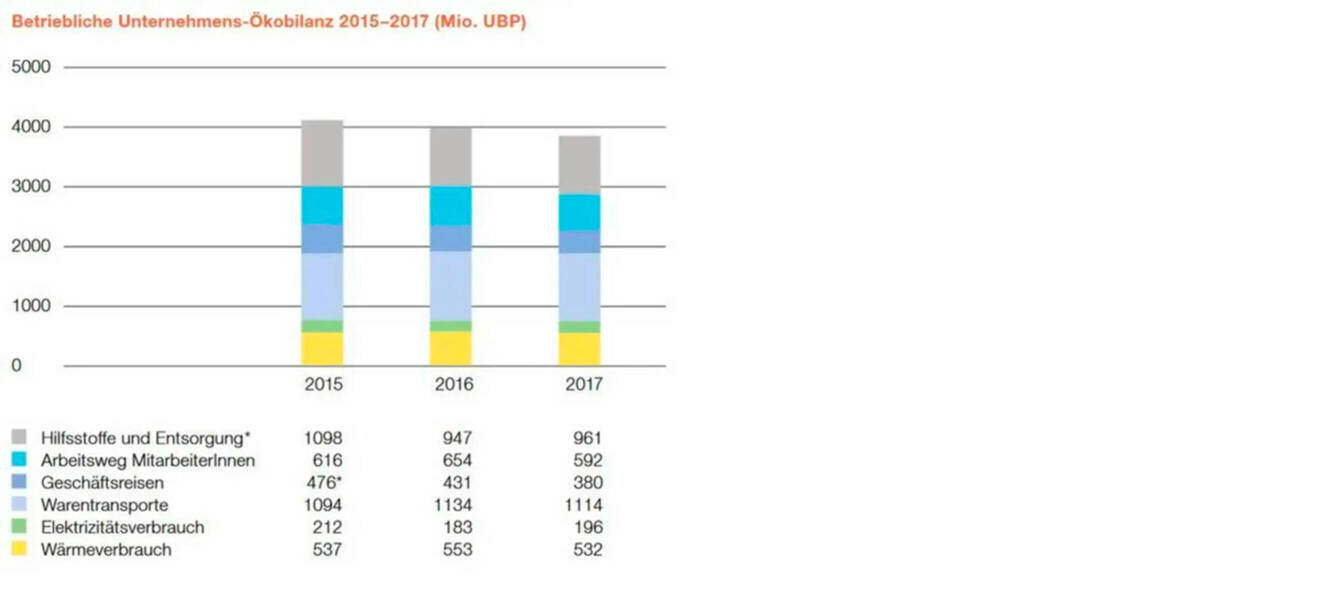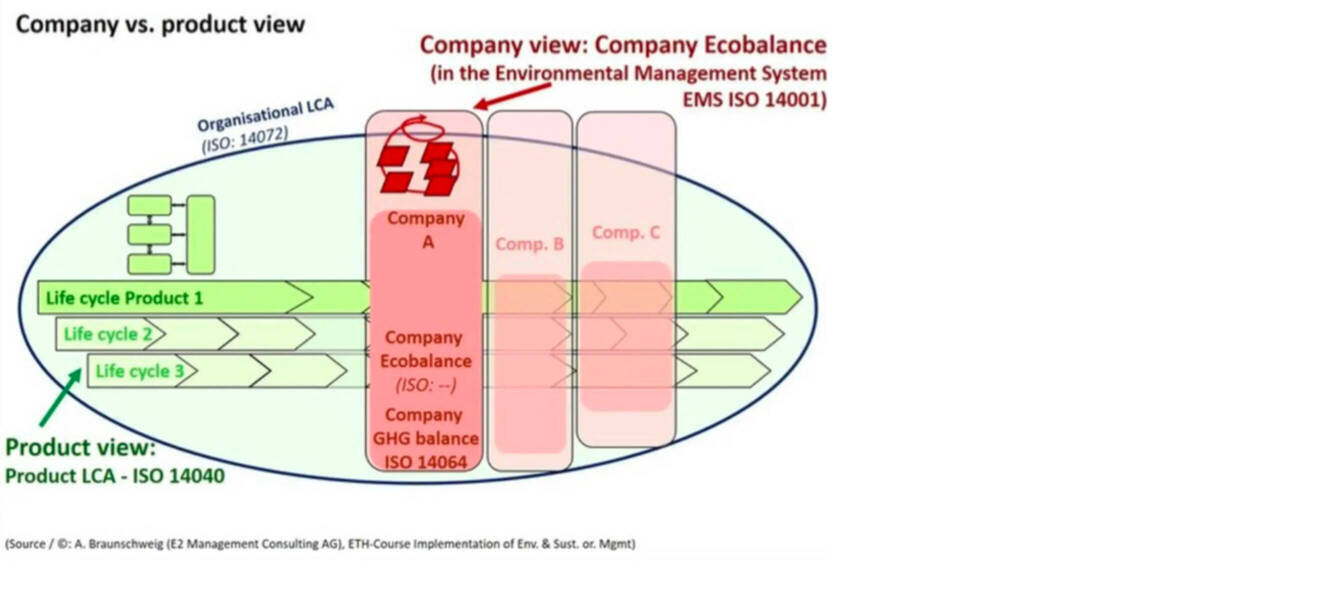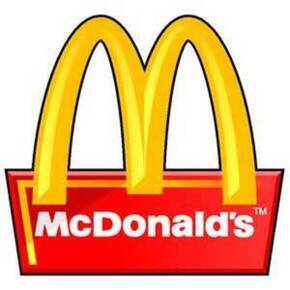Life cycle assessment of the company & LCA What is actually ecologically relevant in the company?
Organisational Ecobalance helps to
- assess environmental priorities (incl. identification of relevant environmental aspects)
- calculate eco-efficiency, and systematically improve it, with optimal cost-benefit-relations
E2 has twenty years of experience in build-up and systematic use of company ecobalance ("organisational LCA"), for controlling, target development, and as communication basis.
Many clients highly estimate the ecobalance as management tool, be it an SME (such as Ernst Schweizer AG Metallbau, or Mondaine Watch AG) or large companies. For example, the company ecobalance of McDonald's (Switzerland) internal processes shows a high ecological relevance of electricity consumption. The switch to electricity from renewabel sources was therefore a plausible step.
A benchmark for environmental management Life cycle assessment of the company
Electricity and fossil energy use, transports, material use: all aspects show up in both ecobalances - but with strikingly different relevance. This shows a first use of company ecobalance, when identifying the relevant environmental aspects, which the environmental management system will ideally focus on.
Company Ecobalance McDonald's (Switzerland), a few years back, expressed in Swiss "Environmental Impact Points":

Ecobalance for companies and LCA for products: Concepts, structure, standards
(Source: McDonald's (Schweiz), CR-Report 2019)
The Ecobalance allowed McDonald's (CH) to focus its environmental management: Energy management received high priority (energy consumption did rise, but less than the number of restaurants and of sales), and recycling of transport packaging got increased. And for many years, the company sources electricity from hydro power.
With an organisational Ecobalance, the company can
- identify the relevant environmental aspects of its activities
- set priorities accordingly
- asses cost-benefit relations and define optimal environmental goals and targets
- define optimal key figures for its eco-controlling
- credibly communicate its environmental performance.
Figure: Ecobalance for companies and LCA for products - Concepts, structure, standards

E2 Management Consulting AG How to
To calculate a company ecobalance, the following steps apply:
- The organisation defines the scope of the "core balance", i.e. which sites and processes shall be analyzed. For this core balance, the environmental flows are quantified (energy and water use, direct emissions, waste streams, etc.; in the terms of the GHG-protocol, this covers scopes 1 and 2)
- In addition, the organisation may include processes from 3rd parties ("complementary balance"; GHG-protocol's scope 3). This may contain supply processes and/or processes at clients' or at end-of-life. Here, too, pertinent data need to be quantified (e.g. the run time of appliances at clients' homes - in order to calculate their energy consumption).
- Data for support processes for all those processes are then taken from databases (e.g. the environmental impacts of electricity generation or of waste incineration).
- All environmental impacts are then assessed, based on available weighting methods, and interpreted.
Eco-efficiency may be expressed for one aspect - today mostly greenhouse gas emissions. However, often an overall environmental assessment across if possible all environmental issues yields better - broader - results. This is especially true for company assessments, which are used for comparisons over time, where single-score weighting methods can account for trade-offs.
In Switzerland, an assessment using the 'Ecopoints' method (Ecopoints 2013) is choice nbr. one, . For organisations in Germany, a German based weighting set is available since 2015. A company based or mainly working in other EU countries, the "ReCiPe" weighting method allows for an overall assessment as well.
New developments in the frameworks of ISO (ISO 14072 'organisational LCA', O-LCA, pilot projekts) and the EU ('organisational environmental footprint OEF') for the first time aim to standardize company ecobalancing: The EU-OEF continues to remain in the shadow of the parallel running EU product footprint, a detailed framework for product LCA. The ISO O-LCA aspires to a overall environmental balance of all products of a company - the widest possible scope of an organisational assessment. This new ISO 14072 standard can be useful for a company which (a) only works with few products , and (b) is already familiar with the concept of product life cycle assessment. Both approaches stand at pilot stage, and we hope they will be designed with a strong enough practicability orientation.
Today, to develop its organisational ecobalance, a step-wise approach usually makes sense: based on available environmental data, a first assessment is made, whereby missing data is educatedly guessed. Where relevant, missing data can then be included in later analyses.
A company ecobalance is an irreplaceable tool for an efficient and effective environmental management.
Management and Assessment methods Methodological notes
The company ecobalance approach of E2 combines the approach of Arthur Braunschweig & Ruedi Müller-Wenk ("Ökobilanz für Unternehmen", Haupt publ. house, Bern, 1993) with the Greenhouse Gas Protocol's approach.
For many years, ISO standards only indirectly offered a basis for company ecobalancing, as ISO 14040 can also be implemented with a "gate-to-gate" scope. The company ecobalance as proposed by Braunschweig/Müller-Wenk therefore can be implemented with the same building blocks as ISO 14040:
- Goal definition & Scoping (Core balance / Complementary balance)
- Inventory (process data, and background data from databases such as Swiss Ecoinvent)
- Impact Assessment (with impact categories, but mainly with weighting methods, such as Swiss Ecopoints)
- Interpretation
SMEs and large companies have for years successfully followed E2's approach (see download) of core and complementary balance. A similar structure is today used by the Science based target concept, which, for a company assessment, recommends to cover the scopes 1 and 2 (= core balance) plus some services from scope 3 - but covers only greenhouse gases. The original approach can be implemented stepwise and with acceptable efforts, especially when using environmental background data, such as Ecoinvent. From the very beginning it yields practical and useful results which can be used for target setting and for controlling.
In recent years, many companies have focused on global warming. This is necessary and to be lauded. At the same time, the other environmental issues must be kept in mind. To see both viewpoints, a company can do the parallel analysis of its own processes and products, both as greenhouse gas analysis (measured in CO2eq) and as full ecobalance (measured, e.g., in Swiss UBP, as described at the bottom of the page, or in Recipe-points). That's how e.g. Mondaine Watch does its environmental monitoring.
***
Our partner Arthur Braunschweig chairs the Swiss LCA discussion forum.
He organised a number of discussion fora, e.g. the 83rd LCA forum on Scope 3 data in organisational LCA, together with Roland Hischier. With Rolf Frischknecht of treeze, he co-organised the 78. Swiss LCA discussion forum on "Life Cycle Thinking = lower environmental footprint? - or: Are LCA pertinent?"; see this short article on linkedin.
Arthur developed the weighting methode for LCA and ecobalances based on "Ecological Scarcity" (link in french/german), back in 1990. He continously participated in the further development, up to being Co-author of its newest, 5th, version "UBP'21": find here a short info (in german) and the full publication in german and english.
E2 Management Consulting AG Projects

Ernst Schweizer AG, Metallbau
Ernst Schweizer AG is focused on all sustainability dimensions in its strategy and its management system.

McDonald's (Schweiz)
Environmental and sustainability management, company ecobalance and greenhouse gas assessment, sustainability reporting.

Schweiz. Bundesverwaltung / RUMBA
RUMBA is the program on resource and environmental management of the Swiss federal administration. It was designed and implemented in more than 40 federal offices by a working group of the administration, supported by E2.

